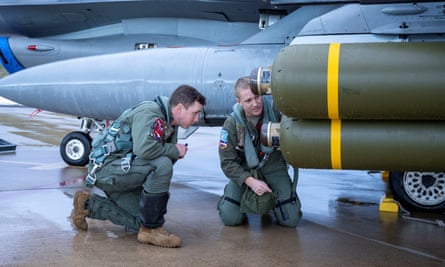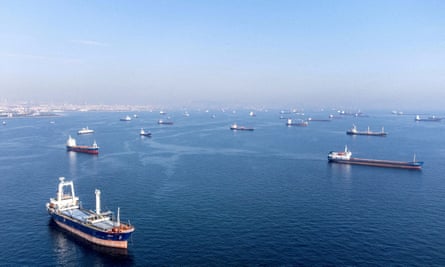Every week we wrap up the must-reads from our coverage of the war in Ukraine, from news and features to analysis, visual guides and opinion.
Zelenskiy fails in effort to secure Nato invitation
Volodymyr Zelenskiy failed in a last-ditch effort to secure an invitation for Ukraine to join Nato after leaders of the 31 countries signed off on a declaration that did not give a firm timetable or clear conditions for its eventual membership.
The frustrated Ukrainian president had accused Joe Biden and other leaders present at a summit in the Lithuanian capital of showing disrespect and complained that there was “no readiness” to invite his country to join, Dan Sabbagh reported from Vilnius.
But the dramatic lunchtime intervention on Tuesday had no impact on the final summit communique, issued a few hours later. It said that while “Ukraine’s future is in Nato”, the alliance would only “extend an invitation to Ukraine” when Kyiv had completed certain “democratic and security sector reforms”.
When Zelenskiy arrived at the summit on Wednesday morning, it was clear some recalibration was needed to avoid a disappointment becoming a falling-out. US and UK officials accused Kyiv of failing to show enough gratitude, Dan reported. At a press conference, the Ukrainian president appeared serious and reserved and was careful to spell out he was grateful to Biden, the US Congress and the American people. “We highly appreciate this,” he said.
In an interview with the Guardian, Ukraine’s top security official later dismissed criticism of Kyiv from British defence secretary Ben Wallace, suggesting Wallace had misspoke due to a surfeit of emotion. “I wouldn’t pay too much attention to what he said,” Oleksiy Danilov, secretary of Ukraine’s security council told Shaun Walker, Nick Hopkins and Jamie Wilson in Kyiv.
Cluster bombs arrive in Ukraine

Cluster munitions provided by the United States have now arrived in Ukraine, the Pentagon confirmed on Thursday. The munitions – bombs that open in the air and release scores of smaller bomblets, as explained by Léonie Chao-Fong – are seen by the US as a way to get Kyiv critically needed ammunition to help bolster its offensive and push through Russian frontlines. US leaders debated the thorny issue for months, before President Joe Biden made the final decision last week, as David Smith and Luke Harding reported.
Rishi Sunak ruled out supplying Ukraine with cluster bombs, Luke and Michael Savage wrote, saying the UK will not follow the Biden administration’s controversial move and will instead press countries to boost their aid to Kyiv “in other ways”.
The decision to provide cluster munitions to Ukraine risks costing the US its “moral leadership” in world affairs, the influential California Democratic congresswoman Barbara Lee said, as reported by Martin Pengelly and Maya Yang. The Guardian, in an editorial, wrote that supplying the bombs was not just a “difficult” decision, but the wrong one.
The foreign volunteers fighting in Ukraine

Alan, a 58-year-old British former marine, says he has no qualms about firing at Russian mercenaries. “These people are going to kill my friends. If I happen to hit them with a bullet so be it,” he told Luke Harding for a report about foreign volunteers in Ukraine. He added: “Some are completely untrained. They run at you without any concept of self-preservation. It’s as if they are drugged. Most of the Ukrainian guys directly on the frontline are young, in their early twenties. They are very, very good soldiers.”
Earlier this year Alan’s battalion, the Da Vinci Wolves Gonor unit, spent months in close combat with Wagner fighters. His task was to keep open the “road of life” – a crucial supply route to the eastern city of Bakhmut, where Ukrainian forces at the time were battling with Yevgeny Prigozhin’s mercenaries. The fighting raged street by street.
Wagner has handed over thousands of tonnes of weaponry

The Wagner group has handed thousands of tonnes of weaponry and ammunition to Russia’s regular army, the country’s defence ministry said this week, as Moscow moves to bring the rebellious mercenary force under its control.
The handover suggests that the Wagner head, Yevgeny Prigozhin, is following through with at least some aspects of the deal he made with the Kremlin last month under which his forces called off their short-lived mutiny, Pjotr Sauer reported.
Meanwhile a Russian general said this week he had been fired as a commander after telling Moscow’s military leadership “the truth” about the dire situation at the front in Ukraine as tensions in the Russian army grow in the aftermath of the Wagner group’s short-lived mutiny, Pjotr and Helen Sullivan reported. And on Wednesday, a senior Russian official said Sergei Surovikin, a top general who has not been seen in public since the Wagner mutiny, was “resting”.
Russia accused of ‘cynical brinkmanship’ over grain deal

Russia is stonewalling in talks about the renewal of a deal that allowed Ukraine to export grain through the Black Sea, the UK envoy to the UN has warned.
Barbara Woodward accused Moscow of “cynical brinkmanship” that makes it increasingly unlikely that the deal will be renewed before Tuesday’s deadline, Patrick Wintour reported.
She said failure to renew the deal would cause global food prices to rise. The deal had allowed more than 32m tonnes of grain and food exports to leave Ukraine over the past year – with two-thirds going to low to middle-income countries, and some going to countries on the brink of starvation such as Afghanistan, Sudan and Somalia.
The volunteers making Ukraine’s Trembita bomb

At an industrial estate near Kyiv, a group of engineers stand next to a tube. The metal device is part of a homemade rocket, Luke Harding wrote this week. After twiddling with an ignition cable, the engine sparks into flame. There is a terrifying, ear-splitting roar. Two dogs that guard the compound slink away and hide; swallows fly off. The centre of the pipe glows red. After a minute, the awful din stops.
Welcome to the Trembita, also known as the “people’s missile”. According to the project’s chief engineer, Akym Kleymenov, the purpose of Ukraine’s first native cruise missile is to overwhelm Russia’s defences. “It’s simple, cheap, and good at exhausting enemy air defence systems,” he says, standing in a garage full of welding equipment, metal cylinders and an old car missing a wheel. Asked if he is a Ukrainian Q, the gadget master from the James Bond films, he replies: “Probably, yes.”

